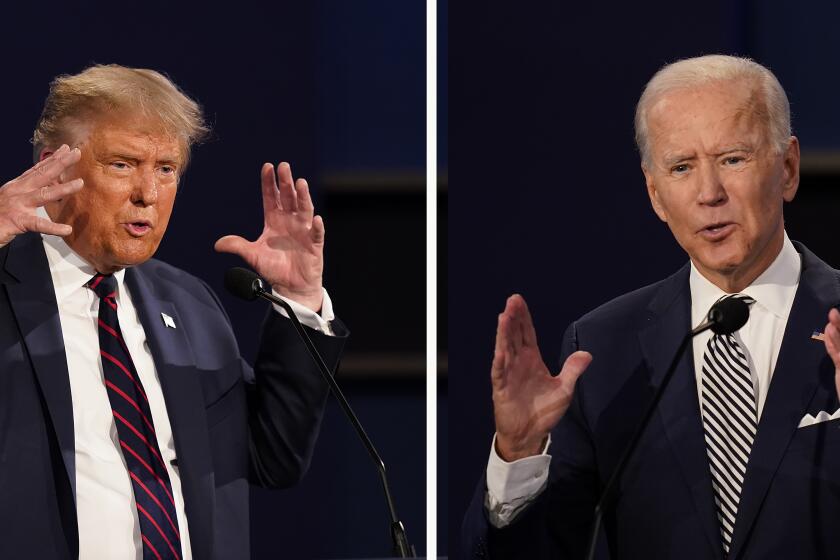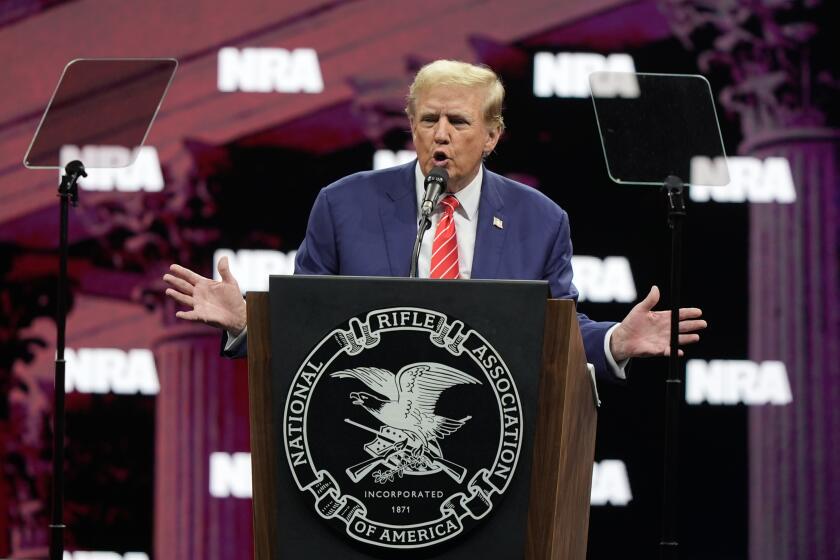Iraq Moves to Reject U.N. Offer : Persian Gulf: Ruling council, top official denounce plan to allow $2 billion in oil exports as an infringement on nation’s sovereignty. Stance is seen as renewed bid to have sanctions lifted.
Escalating a diplomatic standoff with the Clinton Administration, Iraq on Saturday left little doubt that it will reject a U.N. offer to allow the isolated nation to sell $2 billion in oil for humanitarian purposes.
Though Clinton Administration officials stressed that Saddam Hussein’s government had not formally rejected the plan, the ruling Revolutionary Command Council and the Speaker of the Iraqi National Assembly both denounced it Saturday. In Baghdad, thousands of people flocked to the streets for two noisy demonstrations that excoriated both the United States and the U.N. offer.
“I think the voices of the masses have expressed the Iraqi stand. What you have heard from the people is rejection to this decision,” National Assembly Speaker Saadi Mahdi Saleh told Associated Press Television before one of the rallies, which appeared to have been organized by the Iraqi government.
The Clinton Administration reacted cautiously to the initial reports from Baghdad. Neither the White House nor the State Department issued a statement, and officials privately gave no indication that the United States would support a new overture to Iraq.
“The offer remains on the table,” one senior Administration official said Saturday. “We would hope Iraq (will reconsider) upon reflection when they see the (complete) lifting of sanctions is not around the corner.”
On Friday, the United Nations unanimously approved a resolution that would allow Iraq to sell a limited amount of oil to buy food, medicine and other goods for its people.
The United States backed the resolution in part to head off growing pressure from France and Russia to completely lift the sanctions that have barred Iraq from selling oil abroad since the end of the Persian Gulf War in 1991.
Those sanctions have prevented Iraq from earning foreign currency and precipitated shortages in food and other essential commodities, particularly for middle-income and poor Iraqis.
Friday’s resolution imposed strict conditions both on the sale of the Iraqi oil and the use of the proceeds. Every three months, $1 billion in exports would be allowed, and every six months, the Security Council would be called on to renew authorization of the program. The resolution in effect authorized $2 billion in sales.
It also mandated that Iraq ship most of the oil through a pipeline that runs into Turkey and required Iraq to use nearly half the proceeds to pay Gulf War reparations, U.N. costs and relief to Kurds in Iraq’s northern provinces.
Iraqi officials immediately condemned those provisions as an infringement on the nation’s sovereignty. “The new resolution is worse and more dangerous than previous resolutions . . . which Iraq had strongly rejected,” Iraq’s Revolutionary Command Council, which met under President Hussein, said in a statement Saturday.
Experts said Iraq was also rejecting the resolution in hopes of increasing pressure for complete termination of the sanctions. “It’s not surprising Iraq would reject the plan, because their perception was it would take the heat off the international community to lift sanctions,” said Judith Kipper, a Middle East expert at the Brookings Institution in Washington.
Prohibitions on Iraq’s sale of oil are linked to efforts to defang Hussein’s once-formidable military machine. But the United States and some of its allies differ on exactly what conditions Iraq must meet to free itself from the sanctions.
France and Russia are eager to begin normalizing relations with Iraq. They maintain that the resolutions that ended the Gulf War require the United Nations to lift the sanctions once international inspectors confirm that Iraq has eliminated its capacity to produce weapons of mass destruction and provides for a monitoring system to ensure it does not resume such production.
The U.N. Special Commission on Iraq has concluded that Hussein’s government has shut down its programs for nuclear, chemical and long-range weapons. But last week, the commission refused to certify Iraqi compliance on biological weapons, saying that Baghdad had failed to account for 17 tons of material that could be used to breed bacteria for germ warfare.
Some observers said Saturday that Iraq, hoping to escape the sanctions, is likely to meet the U.N. demands on biological weapons within the next several months.
In contrast to France and Russia, the United States argues that the sanctions should not be lifted until Iraq complies with all U.N. resolutions--including requirements that it account for missing Kuwaitis and renounce terrorism. That standard could leave the sanctions in place indefinitely.
*
But both Kipper and retired Gen. Joseph P. Hoar--the former commander in chief of the U.S. military’s Central Command, whose regional responsibilities included Iraq and neighboring countries--said Saturday that, once Iraq brings its weapons programs into compliance, the United States could face substantial pressure from other nations to lift the restrictions on the sale of Iraqi oil.
“This is really the dilemma U.S. foreign policy faces today,” said Hoar, now co-chair of a panel on the Middle East for the Council on Foreign Relations. “In six months, you’re going to be faced with most of the countries on the Security Council saying Iraq is in compliance and we are prepared to lift the oil sanctions.”
The senior Administration official disputed that prediction. “If Hussein is bargaining (that) he can wait four months, comply on biological (weapons) and get the entire oil embargo lifted, he is barking up the wrong tree,” the official said.
More to Read
Start your day right
Sign up for Essential California for news, features and recommendations from the L.A. Times and beyond in your inbox six days a week.
You may occasionally receive promotional content from the Los Angeles Times.






